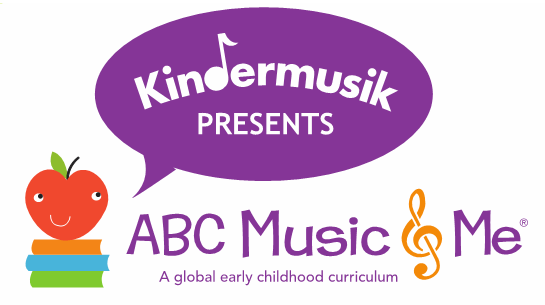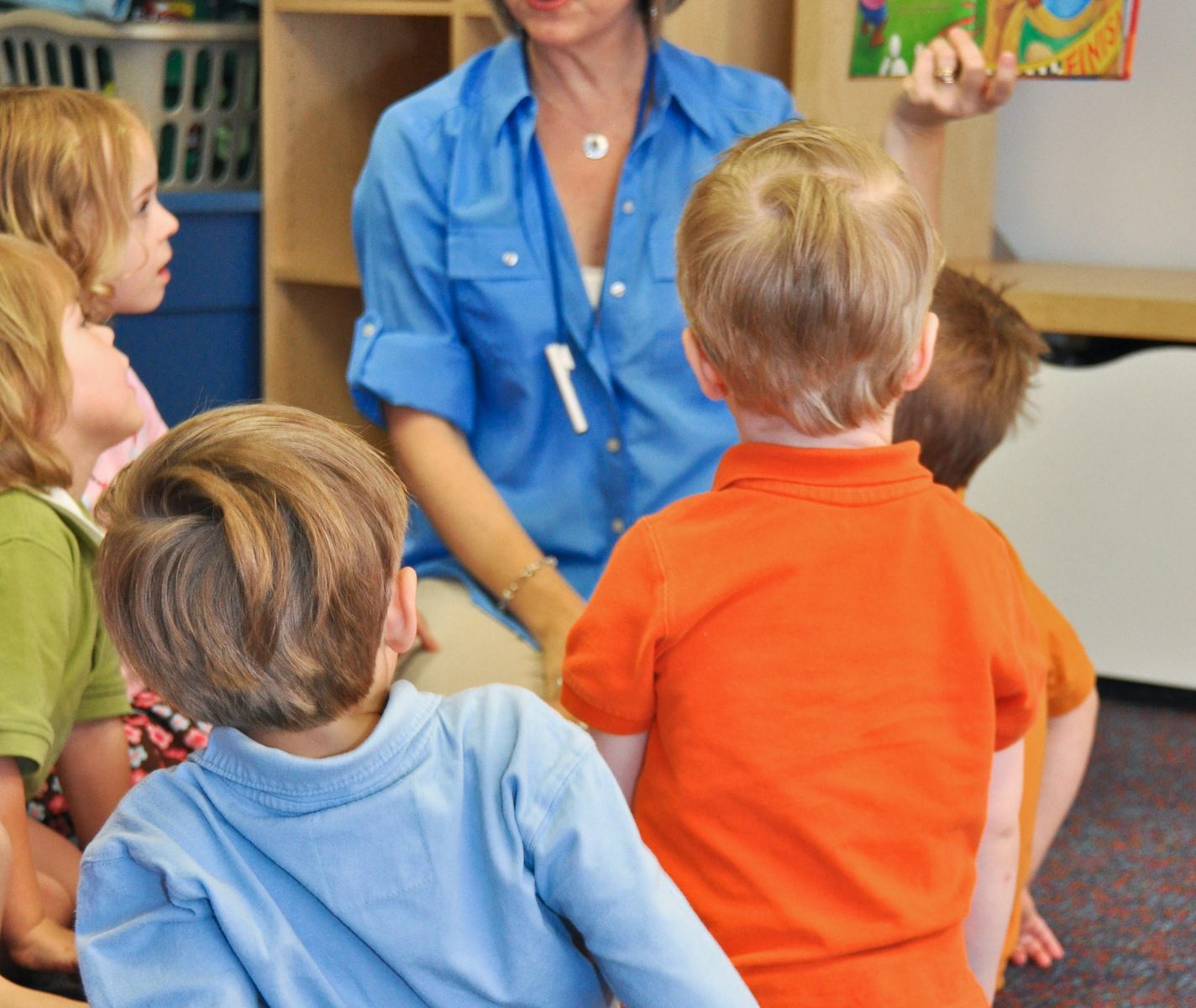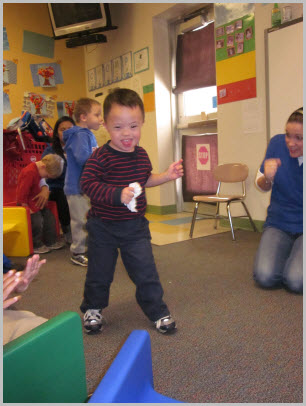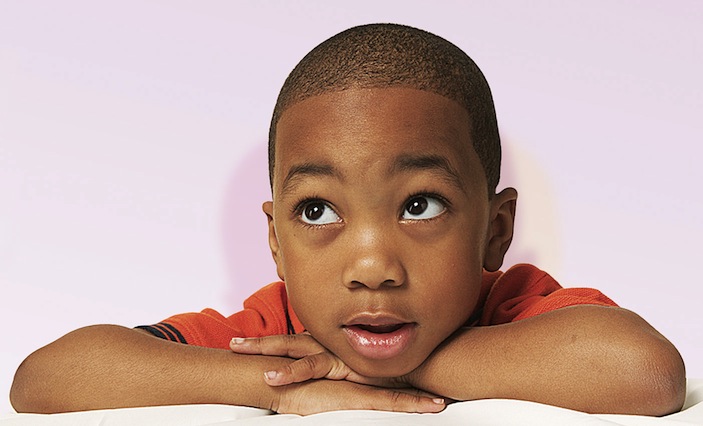Ah, summertime. Warmer temperatures, playing in sprinklers, catching fireflies, and walking barefoot in the grass—summer is the perfect season to “take it outside.” In the world of childcare curriculum development, it can also mean the season of the slide. No, not the slide found at the local playground or park, but the summer slide, which refers to what can happen to the early literacy and language, early math or other cognitive development skills of children who do not participate in learning activities over the summer.
![KindermusikPresents_ABCMusicAndMe_AGlobalEarlyChildhoodCurriculum[1]](https://media2.kindermusik.com/website/sites/2/2014/05/KindermusikPresents_ABCMusicAndMe_AGlobalEarlyChildhoodCurriculum1.png) Thankfully, the benefits of music engage children in learning throughout the year. Summertime can be the perfect season to grab a CD player and take the educational activities outside as part of a childcare summer curriculum. Our early childhood curriculum, ABC Music & Me, includes 3-package units to make it easy to engage children in early literacy and language development as part of a summer camp or as part of summer programming. Plus, Kindermusik includes @Home activities to connect what happens at school with the every day routines and rituals of a family’s life.
Thankfully, the benefits of music engage children in learning throughout the year. Summertime can be the perfect season to grab a CD player and take the educational activities outside as part of a childcare summer curriculum. Our early childhood curriculum, ABC Music & Me, includes 3-package units to make it easy to engage children in early literacy and language development as part of a summer camp or as part of summer programming. Plus, Kindermusik includes @Home activities to connect what happens at school with the every day routines and rituals of a family’s life.
3 summer programming options to take the benefits of music outside
1. Wiggle & Grow celebrates the unique joys of young toddlers. Children will love the songs, stories, and games and early childhood educators will love helping them practice a wide variety of skills such as gross and fine motor, turn-taking, social skills, and active listening.
The summer-friendly 3-unit package includes themes: Up in the Sky, Marvelous Me, Time for Lunch
Sneak-peek at one of the activities from Kindermusik@Home that supports parent involvement in early childhood education:
 From “Up in the Sky”: Sky Counting
From “Up in the Sky”: Sky Counting
Learning number words (e.g., one, two, three, four) is the first number sense skill. Research shows that number sense is a critical early predictor of future mathematics success. A sky full of clouds, airplanes, blimps, and more… 1, 2, 3, 4, 5…families will love counting them all.
2. Laugh & Learn encourages preschoolers’ natural love of music, storytelling, and imaginative play with age-appropriate activities that introduce early music concepts and foster independence, social and emotional skills, language growth and self-control.
The 3-unit summer-friendly package includes themes: Home Sweet Home, Let’s Play, On the Go
Sneak-peek at one of the activities from Kindermusik@Home that supports parent involvement in early childhood education:
 From “Home Sweet Home” Home on the Hive
From “Home Sweet Home” Home on the Hive
Measurement is one of the core areas of early math. In the activity, families will enjoy comparing relative size and position of the bees in the hive.
3. Move & Groove engages students in music and movement activities such as songs, rhymes, and dances that also promote creativity, social-emotional skills, physical coordination, confidence and more. Plus, language rich content boosts vocabulary while strengthening cognitive and literacy skills to help increase school readiness!
The 3-unit summer-friendly package includes: Sounds Abound, Jazz Kitchen, and Dance with Me
Sneak-peek at one of the activities from Kindermusik@Home that supports parent involvement in early childhood education:
From Sounds Abound: Can You Guess What Song?
 In this game, children are asked to identify a familiar song by listening to the sounds presented through a voice humming. Sounds simple—but to be successful, children must process the sounds, connect them to the music and lyrics of songs they know, and then recall the name of the song. Processing skills are the primary skills being exercised here. Processing, or the ability to perceive information, is an important cognitive skill that starts developing rapidly during the preschool and early school years.
In this game, children are asked to identify a familiar song by listening to the sounds presented through a voice humming. Sounds simple—but to be successful, children must process the sounds, connect them to the music and lyrics of songs they know, and then recall the name of the song. Processing skills are the primary skills being exercised here. Processing, or the ability to perceive information, is an important cognitive skill that starts developing rapidly during the preschool and early school years.
Want to learn more about taking the benefits of music outside at your preschool or childcare center as part of your summer programming? Email us at info@abcmusicandme.com.



 Yes. You read the title correctly. Early childhood teachers give kids the gift of gab. Research proves it! A team of researchers at UNC’s Frank Porter Graham Child Development Institute recently published a compilation of studies that shows how early childhood educators positively impact the language development and communication abilities of infants and toddlers.
Yes. You read the title correctly. Early childhood teachers give kids the gift of gab. Research proves it! A team of researchers at UNC’s Frank Porter Graham Child Development Institute recently published a compilation of studies that shows how early childhood educators positively impact the language development and communication abilities of infants and toddlers.





